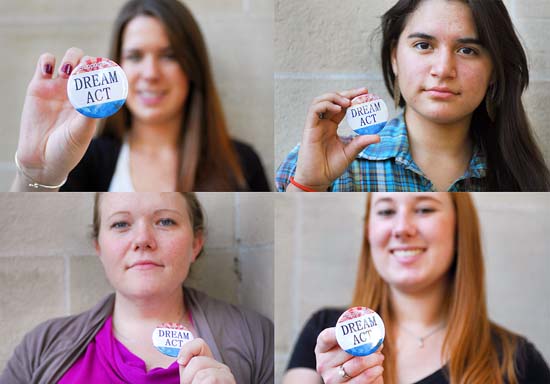CORRECTION: A previous version of this article should have specified that while Gov. Arnold Schwarzenegger vetoed the DREAM Act in California, he has no jurisdiction over the federal bill of the same name and intent, which has not yet been voted on by the Senate.
It was after being accepted into UCLA as a high school senior that Sofia Campos found out she was not a registered United States citizen.
“My friends and I were filling out our (Free Application for Federal Student Aid) forms, and I asked my parents for my social security number. Then they told me I didn’t have one,” Campos, a fourth-year political science and global studies student, said.
Campos, who has lived in California since she was six years old, was not legally allowed to apply for financial aid, and her high school counselor had no helpful information or advice to offer. Instead he suggested that she turn down UCLA and opt for a community college.
On Oct. 22-23, Campos and several UCLA students participated in the national lobbying days for the Development, Relief and Education for Alien Minors Act.
The DREAM Act is a piece of legislation designed to provide financial aid for undocumented college students as well as to create a pathway to citizenship. However, Governor Arnold Schwarzenegger vetoed the act in California in October 2007 because of the state’s limited financial aid resources.
Several students representing various UCLA organizations, including the Undergraduate Students Association Council, met on Friday with the staff of Congressman Brad Sherman, who represents the San Fernando Valley.
“We’ve invested in these individuals from kindergarten to 12th grade, and it’s important to keep that investment in our country,” said Allison Clark, a second-year political science student and member of Bruin Lobby Corps.
Proponents of the legislation say that, by providing them with financial aid for college and a clear pathway for gaining citizenship, students who have been raised and educated in America can access higher education. Making college an opportunity for people will help in creating a more educated work force, and streamlining the citizenship process will allow people to put their degrees to work after graduation, Campos said.
“There’s no difference between them and us. We really are all Americans, whether we’re citizens or not. It’s just the right thing to do,” Clark said.
Since Sherman and several of his staff are UCLA alumni, students such as Melanie Schmidt, a fifth-year history doctorate candidate and founding member of WeChangeLA, thought the congressman would be more sympathetic to their arguments.
“(Congressman Sherman is) a Bruin alum, and UCLA students are being affected by this,” Schmidt said.
The goal of Friday’s meeting was to encourage the congressman to join 102 of his peers and officially cosponsor the federal DREAM Act. His office had informed the students prior to the meeting that Sherman is in favor of comprehensive immigration reform and sees the DREAM Act as a “chip” in the larger table of discussion, Schmidt said.
According to Caitlin Lawrence-Toombs, a fourth-year political science student and assistant external vice president for local affairs, that tone changed during the meeting. Lisa Montano, Sherman’s staff member, told the students she was not sure how the congressman would vote if the DREAM Act came to the floor, Lawrence-Toombs said.
Montano and the other staff members who were present at the meeting were not available for comment, as they were out of town at a conference, according to Sherman’s office.
While the students were unsuccessful in meeting their goal, they did not express any diminished determination.”His staff seemed to be surprised by how many people have already signed on and who they are. There seemed to be an element of peer pressure there, and I think that’s a good thing,” Lawrence-Toombs said.
Those who attended Friday’s meeting expressed a clear determination to get Sherman to take a stance in support of the DREAM Act.
“We’re not willing to let it sleep,” Schmidt said.
IDEAS, Bruin Lobby Corps and WeChangeLA plan on attending Sherman’s town hall meetings to raise the issue of the DREAM Act, as well as hosting events in his region to inform his constituency on what exactly the act consists of so they too can apply pressure to their congressman.
“Most officials who haven’t supported the DREAM Act just don’t know what it is,” Campos said.
This apparent lack of information is precisely why Bruin Lobby Corps set up a lobby workshop on Oct. 20, in an effort to educate and equip students who are actively lobbying government representatives to support the act.
“We wanted to give people all the detailed information so that they were fully prepared for any questions and could make the best arguments possible; they can cover all the bases,” Lawrence-Toombs said.
In addition to the passion expressed by various UCLA campus organizations, the United States Student Association, of which USAC is a part, has adopted the DREAM Act as one of its two national campaigns.
USSA will be lobbying at the national level to help pass the legislation.
“Right now there is no legit way of obtaining your status,” Campos said.
The DREAM Act would provide some much-needed clarity on how to gain citizenship as well as financial support for obtaining a college education, Campos added.
Through organizations that raise money for scholarships for undocumented UCLA students and allow them to pay in-state tuition, Campos found the means to attend the college of her choice. She was able to attend UCLA her first year and is now in the process of gaining her California residency.
